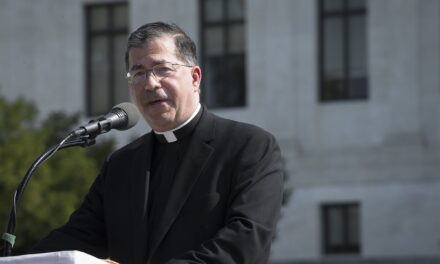Every four years the Catholic bishops publish a document entitled “Forming Consciences for Faithful Citizenship.” This document represents the official guidance given to Catholic voters in a national election. In my opinion, “Forming Consciences” is seriously flawed, offering four loopholes allowing Catholics to look away from candidates who support abortion, an intrinsically moral evil.
Why?
When it was substantially rewritten in 2008, it contained several Sections, 34-37, that are capable of being interpreted to allow Catholics to virtually ignore intrinsic evils such as abortion. It also allowed heterodox groups like the Catholic Democrats to cherry pick passages for prominent display and constant reference to confuse Catholic voters.
Take this example from Section 35;
“There may be times when a Catholic who rejects a candidate’s unacceptable position may decide to vote for that candidate for other morally grave reasons.Voting in this way would be permissible only for truly grave moral reasons, not to advance narrow interests or partisan preferences or to ignore a fundamental moral evil.” [Emphasis added].
Here’s the confusion, just what “morally grave reasons” would justify a Catholic ignoring, say, Hillary Clinton’s support of abortion-on-demand? Or her support of federal funding Planned Parenthood and abortion insurance coverage? After all, in the very next sentence the Bishop’s say a voter should not “ignore a fundamental moral evil.” I guess it comes down to what a “candidate’s unacceptable position” might be, but that is left unnamed.
This passage was cited in discussions of “Faithful Citizenship” held across the nation’s parishes in both 2008 and 2012, and being cited now in the 2016 election. Anyone looking for clarification of the implication found in this passage would not be helped with the equally confusing Section 34 preceding it:
“A Catholic cannot vote for a candidate who takes a position in favor of an intrinsic evil, such as abortion or racism, if the voter’s intent is to support that position. In such cases a Catholic would be guilty of formal cooperation in grave evil. At the same time, a voter should not use a candidate’s opposition to an intrinsic evil to justify indifference or inattentiveness to other important moral issues involving human life and dignity.” [Emphasis added]
In other words, a Catholic could vote for a pro-abortion candidate as long as he or she did not intend to support his pro-abortion position. What is a person to say to that? The practical consequence of this statement is clear: Catholics can vote for any pro-abortion politician they want — all they have to do is have the right intention. This makes choice of which candidate to vote for a matter of interior self-examination, not careful consideration of a candidates position on key moral issues.
The bottom line: “If the voter’s intent is to support that position,” meaning if the voter’s intent not to support that position, then a Catholic may vote for candidate who supports abortion on demand.
Section 36 only adds to the confusion about whether or not a Catholic voter can or cannot vote for a pro-abortion politician:
“When all candidates hold a position in favor of an intrinsic evil, the conscientious voter faces a dilemma. The voter may decide to take the extraordinary step of not voting for any candidate or, after careful deliberation,may decide to vote for the candidate deemed less likely to advance such a morally flawed position and more likely to pursue other authentic human goods.” [Emphasis added]
A Catholic voter, therefore, can vote for pro-abortion politicians as long as they do not “advance” that “morally-flawed position” but would “pursue other authentic human goods.” Could it be more obvious that this a loophole that invites political dishonesty and individual self-deception? This section once again pushes a voter into the kind of scrutiny that draws attention away from the obvious outcomes of voting for a pro-abortion candidate.
In the 2016 election, it is not the case that Catholic voters are faced with two pro-abortion candidates. Clinton publicly avows, even celebrates, abortion on demand. Trump promises to be a pro-life president, to sign a bill defunding Planned Parenthood, appointing pro-life Supreme Court justices, and ending Obamacare.
These sections contain three loopholes allowing Catholic voters to support pro-abortion politicians:
1) If they do not intend to support that position (34), or
2) if there are offsetting “morally grave reasons” (35), or
3) if a candidate will pursue “authentic human goods” rather than the “morally-flawed” position he holds (36).
After positing these loopholes, how can the bishops expect Catholic voters to make sense of the following paragraph, Section 37, providing a fourth loophole:
“In making these decisions,it is essential for Catholics to be guided by a well-formed conscience that recognizes that all issues do not carry the same moral weight and that the moral obligation to oppose intrinsically evil acts has a special claim on our consciences and our actions. These decisions should be taken into account, along with a candidate’s commitments, character, integrity, and ability to influence a given issue.” [Emphasis added]
Catholic voters are advised to “take into account a candidate’s commitments, character, and ability to influence a given issue” in spite of his or her support of “intrinsically evil acts.” No doubt the Democratic Party lobby inside the Catholic bureaucracy will be very busy dismissing concerns about the support of Clinton/Kaine for abortion by dwelling on the media-driven hysteria over Donald Trump’s “character.”
Why should a Catholic voter feel the weighty obligation to oppose “intrinsically evil acts” when the bishops themselves provide four different loopholes to put that concern aside?
There is one question I would appreciate the bishops answering, because it’s not answered in the 2016 version of “Faithful Citizenship”: What are the “morally grave” or proportionate reasons that would justify a Catholic voting for a pro-abortion candidate when only one of the two candidates is pro-abortion?
It certainly cannot be the “flawed” character of Donald Trump. Hillary Clinton is mired in obvious and repeated acts of dishonesty, disregard for the rule of law, and the putting of American lives at risk while Secretary of State. If there’s a character issue, it works both ways.
Since the bishops have republished the 20o8 version of “Faithful Citizenship” without changes, they are providing Catholic voters another carte blanche to cast their vote for any pro-abortion candidate they want.
The incoherence of Sections 34-37 do not serve the building of a culture of life in our nation.















I agree. Very Good analysis. Several days ago I was reviewing the Bishop’s pamphlet handout from 4 years ago…and I concluded that it was not clear enough for the average Catholic. Somehow we have to simplify a complex subject. How’s this…I’m praying for God to help our Country and voting Trump!
JMJ
Thank you Deal!